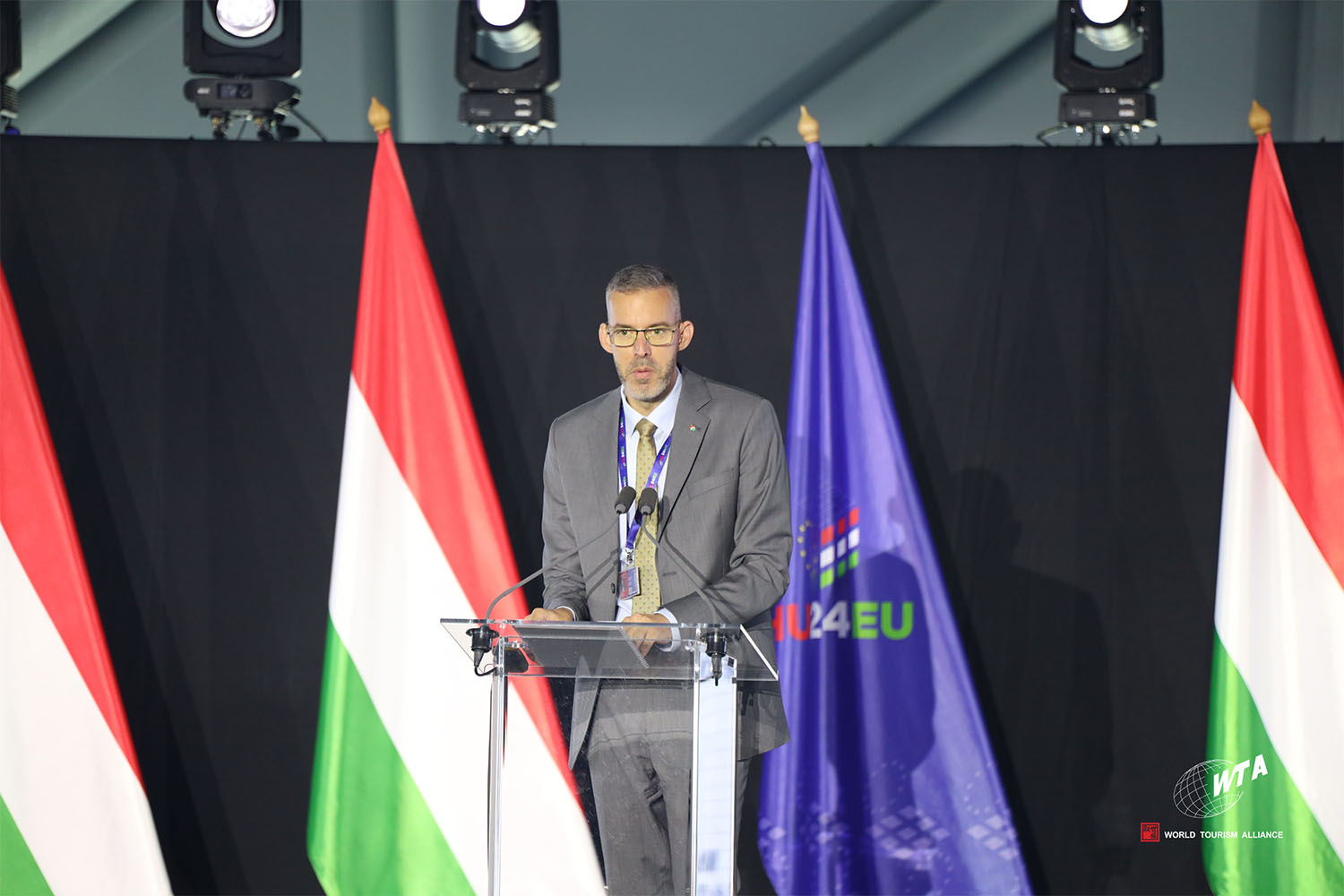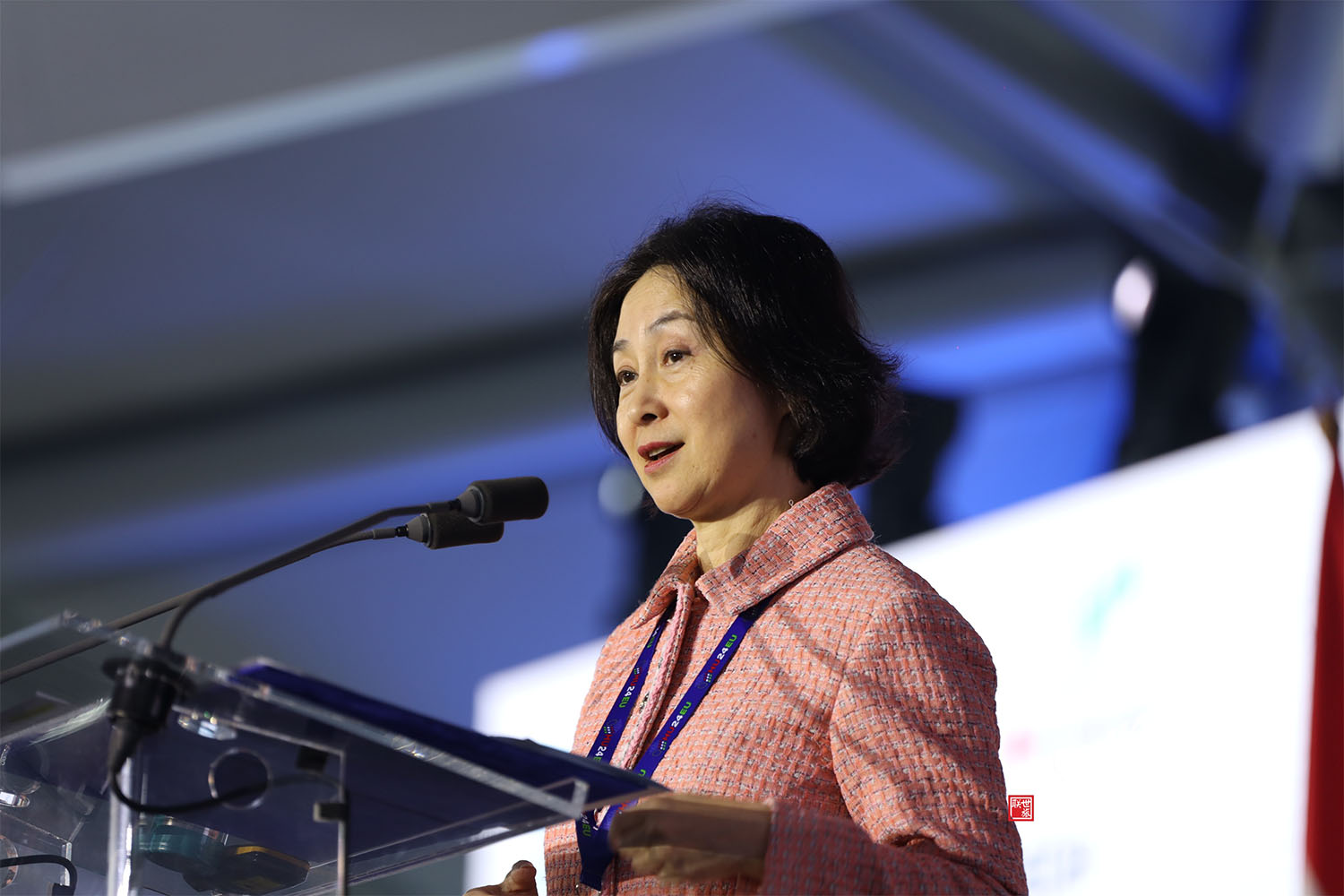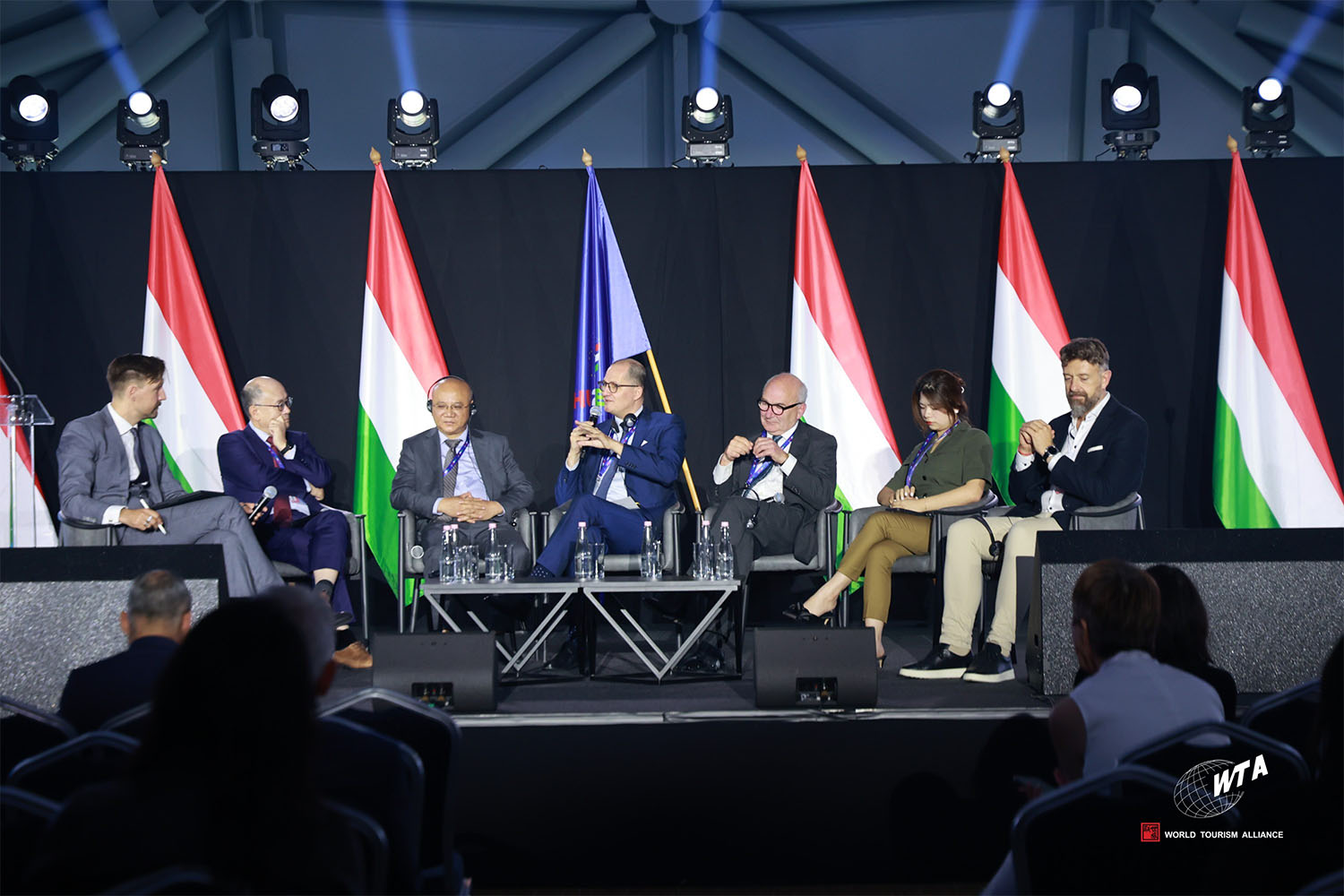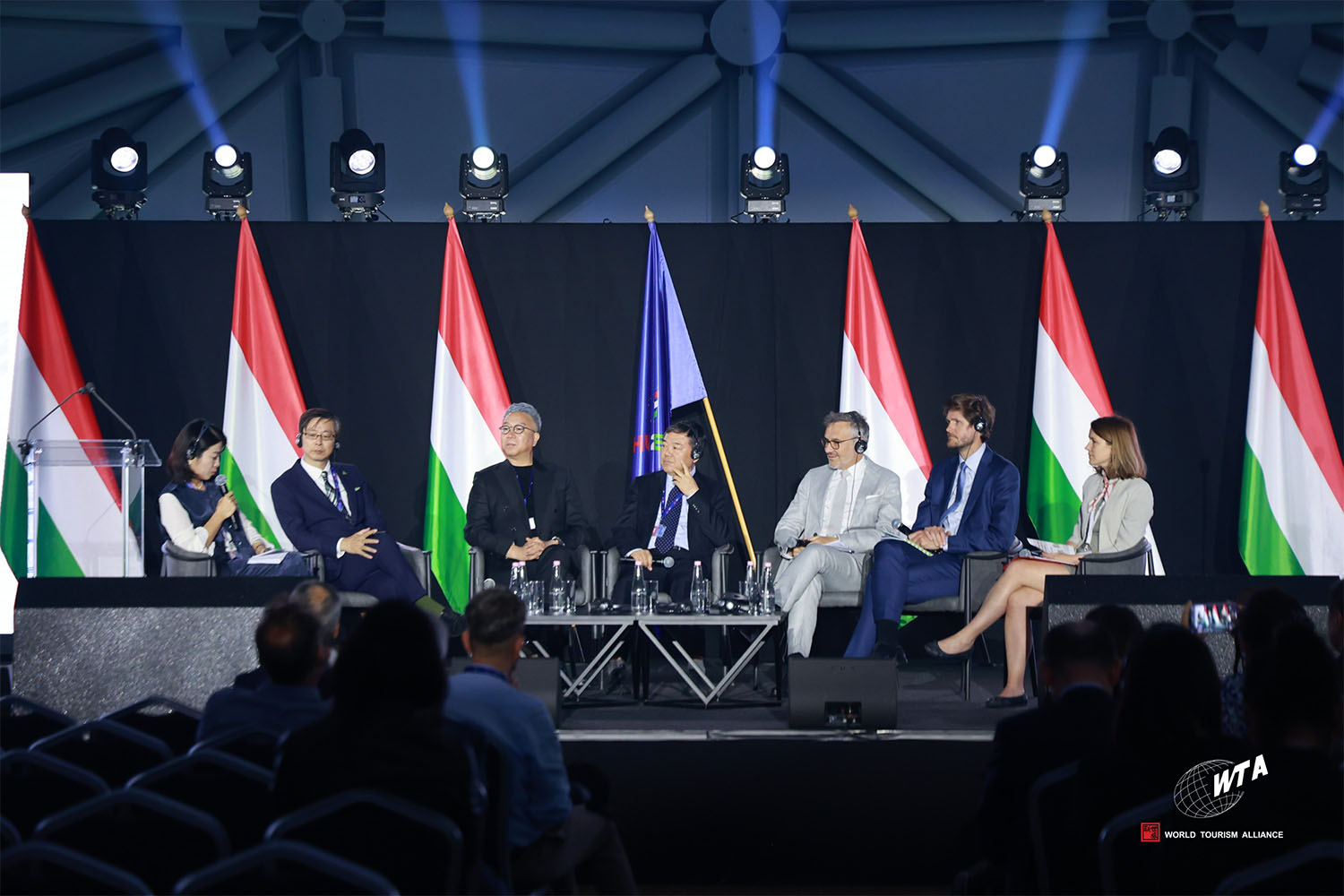2024.07.09

Budapest, Hungary – The picturesque Donau River, with its shimmering waters, set the stage for an enchanting event. The Bálna, Budapest, nestled on the riverbank, sparkled like a gem, capturing the attention of the world. From July 3-4, the World Tourism Alliance (WTA), the European Travel Commission (ETC), and the Hungarian Tourism Agency co-hosted the “Europe-China Tourism Dialogue” (hereinafter referred to as the “Dialogue”), bringing together global tourism leaders to discuss sustainable tourism development and the future of Europe-China tourism cooperation.
During the event, guests from global tourism industry focus on the theme “Tourism, Bridging China and Europe for a Shared Future”, jointly exploring sustainable development paths and practices for the China-Europe tourism industry and highlighting new trends, changes, technologies, and ideas in global tourism. This event showcased the profound exchange and cooperation between China and Europe’s tourism sectors, initiating a dialogue that spanned cultures and resonated deeply.
Strengthening Ties: New Bridges of Cooperation
This year marks the 75th anniversary of diplomatic relations between China and Hungary. Two months ago, President XI Jinping’s state visit to Hungary elevated bilateral relations to a comprehensive strategic partnership. Tourism, a crucial sector for fostering China-Europe cooperation, played a pivotal role in this historic visit. The “Europe-China Tourism Dialogue” was the first international tourism conference held by Hungary after assuming the Presidency of the Council of the European Union on July 1. Supported by the Ministry of Culture and Tourism of the People’s Republic of China, the Ministry for National Economy of Hungary, and the Ministry for EU Affairs of Hungary, the event underscored the importance of tourism as a bridge between cultures and economies.
 ZHANG Xu, WTA Chair
ZHANG Xu, WTA Chair
As Mr. ZHANG Xu, WTA Chair, noted, Europe has always been a focal area for WTA’s work. Besides Mainland China, Europe boasts the highest number of WTA members, with the most active and closely-knit collaborations. The “Europe-China Tourism Dialogue” reflects the enthusiasm and expectations of various sectors in China and Europe for the future of tourism.
 NAGY Márton, Minister of National Economy of Hungary
NAGY Márton, Minister of National Economy of Hungary
Mr. NAGY Márton, Minister of National Economy of Hungary, reiterated Hungary’s commitment to promoting tourism policy coordination and innovation. He emphasized that Hungary, after officially assuming the Presidency of the Council of the European Union, aims to integrate and share tourism resources within the EU and strengthen international cooperation, including with China. This effort is intended to inject new momentum into the prosperous development of the EU’s tourism industry.
 GONG Tao, Ambassador of China to Hungary
GONG Tao, Ambassador of China to Hungary
Ambassador of China to Hungary, Mr. GONG Tao, participated throughout the event. He emphasized that the “Europe-China Tourism Dialogue” not only witnessed the friendly relations between the two countries but also marked the fruitful cooperation in tourism between China and Europe. He expressed hope that China, Hungary, and the EU tourism industries would seize this opportunity to further enhance information exchange and resource sharing, cooperate closely, and pursue joint development, injecting new vitality into China-Europe cultural and tourism collaboration and further strengthening China-Europe relations.
 Eduardo SANTANDER, Executive Director of the European Travel Commission and WTA Vice Chair
Eduardo SANTANDER, Executive Director of the European Travel Commission and WTA Vice Chair
“Tourism is a powerful link that brings people, cultures, and economies together”, said Mr. Eduardo SANTANDER, Executive Director of the European Travel Commission and WTA Vice Chair. He looked forward to using this dialogue to share practical experiences, enhance mutual understanding, improve tourism experiences, jointly promote sustainable tourism, and strengthen China-Europe connections, supporting the sustainable growth of the industry.
 KÖNNYID László, CEO of the Hungarian Tourism Agency
KÖNNYID László, CEO of the Hungarian Tourism Agency
As the host of this event and the Presidency of the Council of the European Union, Hungary played a vital role in the success of this event. Mr. KÖNNYID László, CEO of the Hungarian Tourism Agency, stated that as an EU member state, Hungary is the country in Central and Eastern Europe with the most connections to China. Hungary has made significant contributions to the growth of international tourism between the EU and China on a regional level. In the future, Hungary hopes to further serve as a catalyst for China-Europe cooperation.
In the complex, ever-changing international landscape, organizing the event required even more wisdom and meticulous planning. To this end, the organizers conducted multiple rounds of in-depth discussions and explorations regarding the content, agenda, and format of the event. Mr. LIU Shijun, WTA Vice Chair and Secretary-General, led a delegation to Budapest for extensive discussions with the ETC and the Hungarian Tourism Agency, coordinating and reviewing the progress of the preparations. During high-level meetings, both parties precisely focused on key issues to ensure a successful event.
The meticulously planned event featured keynote speeches, roundtable discussions, results presentations, and a closing ceremony. It also included photo exhibitions, virtual reality experiences, intangible cultural heritage showcases, and traditional music performances, providing a comprehensive and multi-faceted presentation of the topics. Participants praised the well-organized, content-rich, and diverse format of the event, which not only offered a platform for in-depth discussion on tourism development trends and sharing success stories but also brought new insights and inspiration for promoting China-Europe tourism exchange and sustainable development.
 Miguel SANZ, President of the ETC
Miguel SANZ, President of the ETC
This enlightening exchange has strengthened the determination of China and Europe to promote pragmatic cooperation in tourism. Mr. Miguel SANZ, President of the ETC, stated that Europe is the world’s number one tourist destination, and China’s significance to Europe and its economy is undeniable. He emphasized the necessity of fostering cultural exchange between China and Europe, allowing Chinese tourists to experience Europe’s diverse cultures and providing Europeans with more opportunities to understand Chinese culture. Ms. Amaryllis VERHOEVEN, Acting Director in charge of Tourism, Textiles, Digital Transformation of Industry and Social Economy at the European Commission (DG GROW), highlighted the critical role of tourism in the EU’s economic growth, job creation, and cultural exchange. She pointed out that tourism is a key factor in enhancing regional competitiveness. Ms. VERHOEVEN also expressed hope that this Dialogue would foster greater cultural exchange and tourism cooperation between China and Europe, helping to address challenges such as over-tourism, labor shortages, digitization, and climate change.
 LIU Shijun, Vice Chair and Secretary-General of the WTA
LIU Shijun, Vice Chair and Secretary-General of the WTA
This exchange has also bolstered the determination to deepen friendly cultural exchanges between China and Europe. Mr. LIU Shijun, Vice Chair and Secretary-General of the WTA, passionately believes that “Travel is the best way to eliminate ignorance”. He believes that when people from China and Europe come together, visit each other’s countries, cities, and communities, and approach each other’s people, they will overcome unfamiliarity, misunderstandings, and prejudices, as well as all obstacles and difficulties, jointly moving toward a brighter future.
 Pansy HO, WTA Vice Chair, Vice Chairman and Secretary-General of the GTEF and Executive Chairman and Managing Director of Shun Tak Holdings Ltd.
Pansy HO, WTA Vice Chair, Vice Chairman and Secretary-General of the GTEF and Executive Chairman and Managing Director of Shun Tak Holdings Ltd.
This exchange has also strengthened the confidence of enterprises investing in the tourism industry. Ms. Pansy HO, WTA Vice Chair, Vice Chairman and Secretary-General of the GTEF and Executive Chairman and Managing Director of Shun Tak Holdings Ltd., believes that China, as one of the world’s largest tourism markets, should fully utilize this advantage to deepen tourism exchanges and cooperation. She emphasizes the importance of accelerating cultural and tourism innovation, advancing technology and digital applications, and establishing a higher quality and more sustainable tourism ecosystem.
 Jane SUN, CEO of Trip.com Group
Jane SUN, CEO of Trip.com Group
Ms. Jane SUN, CEO of Trip.com Group, analyzed the future prospects and highlighted the bright future of tourism between Asia and Europe. She emphasized that close diplomatic and commercial ties, along with increasing cultural exchanges, will continue to drive the growth of the tourism industry. As international relations and exchanges strengthen, it is essential to recognize the significant contributions of tourism in reinforcing these connections.
To promote the Chinese inbound tourism market, the Chinese government has implemented a series of supportive policies. Mr. LI Huixin, Director of the China National Tourist Office Budapest, introduced various measures that international tourists, including those from Europe, can enjoy when traveling to China. These measures include more direct flight routes, visa-free entry for certain countries, pilot programs for visa-free entry at Chinese ports, and convenient payment methods. These initiatives showcase China as an open and friendly international tourism destination, enhancing its appeal to global travelers.
This event was a vivid example of the friendly exchanges and mutual understanding between the people of China and Europe. Currently, the two-way tourism between China and Europe is showing a positive recovery trend, becoming an important growth point for China-Europe relations. The Cross-Border Tourism Consumption Trends Report 2023-2024, jointly released by the WTA, Mastercard, Trip.com Group, and Alipay during the forum, indicated a significant increase in the duration of stays at destinations like Europe. Additionally, the Europe-to-China tourism market has seen robust recovery, with visitor numbers from France, Spain, and Italy increasing approximately fourfold compared to the same period in 2023.
“True friendship transcends distance, making even distant lands feel like close neighbors”. This sentiment underscores the importance of fostering deep connections between China and Europe. Accelerating China-Europe tourism exchange and cooperation has become a broad consensus. During the high-level meetings of the “Europe-China Tourism Dialogue”, participants agreed that the dialogue provided an excellent platform for exchange between the Chinese and European tourism industries. As important tourist destinations and source markets for each other, the strengthened dialogue and cooperation between China and Europe are crucial for promoting the comprehensive recovery and development of tourism and enhancing cultural exchanges between the two regions.
New Dynamics: Artificial Intelligence as a New Engine for the Industry
 Roundtable Discussion: Artificial Intelligence Enhances the Competitiveness of the Tourism Industry – Big Data Drives Sustainable Tourism Development
Roundtable Discussion: Artificial Intelligence Enhances the Competitiveness of the Tourism Industry – Big Data Drives Sustainable Tourism Development
Artificial intelligence (AI) is sweeping across the globe, profoundly impacting the travel and tourism industry. Attendees of the Europe-China Tourism Dialogue universally acknowledged AI’s vast potential in enhancing efficiency, optimizing planning, and stimulating creativity in various fields.
“We are entering a new era of artificial intelligence”, said Mr. Olivér CSENDES, CEO of Visit Hungary. “We view AI as an ecosystem where various technologies interact to support the entire customer journey. Data and AI will connect different industries and establish closer cooperation between countries”.
How does AI empower the tourism industry? Mr. SONG Haiyan, Associate Dean and Chair Professor at the School of Hotel and Tourism Management, the Hong Kong Polytechnic University (PolyU), believes that integrating cultural tourism with technology can enhance the experience of young tourists, reduce operating costs, and improve profitability. By leveraging AI and digital technology, tourists can immerse themselves in environments from millennia ago, gaining a deeper understanding of history and culture.
“AI will not replace humans, but those who use AI may replace those who do not”, said Mr. Magnus HESSBO, Senior Advisor and Program Lead of Group NAO. The technological revolution brought about by AI will have a profound impact on the travel and tourism industry, akin to the advent of smartphones.
Mr. George CAO, Co-founder and CEO of Dragon Trail International, believes AI will permeate all aspects of the tourism industry, not just individual areas. The industry must stay abreast of AI developments to use it as a tool for improving core business profitability.
“Fliggy believes that AI development will be a key node driving the future of the tourism industry”, said Mr. TONG Teng, Vice President of Fliggy. “The greatest potential of AI and tourism lies in providing customized solutions based on consumer needs. The future of tourism should offer unique experiences for each traveler”.
Ms. Cathy WU, Head of Outbound Travel of Tourism Department at Xiaohongshu, introduced that as China’s leading lifestyle platform, the Xiaohongshu business team is dedicated to leveraging technology, digital products, and insights from data and content to identify trending topics and travel trends on social media, assisting partners and brands in expanding their businesses.
Despite AI’s benefits, it also presents significant challenges, such as privacy protection, bias elimination, accountability, and transparency. The industry is keenly aware of these issues and is working to manage them effectively.
Mr. Alexander RAYNER, Chief Executive Officer at SmartData.travel Limited, warned that the performance of AI in everyday applications still needs improvement and is dependent on the integrity and quality of data. Privacy and data security issues cannot be ignored, posing serious threats to companies and governments. Caution and risk-benefit assessments are crucial when using AI.
How to strengthen AI regulation? Ms. Marlène BARTES, Policy Officer in charge of Tourism at the European Commission (DG GROW), stated that the core element of generative AI is data. Data has been a long-term focus of the European Commission, which is currently promoting the construction of the “European Tourism Data Space” to create a common data space for the tourism industry in Europe. The core goal is to facilitate data sharing and reuse among different types of stakeholders.
Mr. JIANG Lieyi, CEO of Future Plus Technologies (Beijing) Co., Ltd., believes that for AI to achieve large-scale deep applications, the core issue is how to verify AI capabilities and quality and build trust. This involves addressing data security, algorithm safety, and ensuring AI operates without specific biases or agendas.
Participants unanimously agreed that it is essential to accurately grasp the forefront trends of new technologies, new media, and new consumption. Actively promoting innovation in tourism management methods, marketing models, and product forms will guide the tourism industry towards a higher quality, more efficient, and more sustainable development trajectory.
New Demand: Sustainable Development Driving Tourism Trends
 Roundtable Discussion: The Role of Art and Culture and New Media Communication in Marketing
Roundtable Discussion: The Role of Art and Culture and New Media Communication in Marketing
During the event, attendees visited local sites including Buda Castle, the House of Hungarian Music, and the Museum of Ethnography. These visits highlighted the deep integration of local cultural heritage, urban architecture, modern art, and tourism, reflecting the future trends in tourism development, particularly the shared environment between tourism and local communities.
The sustainability of the environment and community became a hot topic among the guests. Mr. Balázs KOVÁCS, CEO of GD Consulting, stated that we have entered the third stage of consumer society. The first stage was selling products, the second stage was selling services related to products, and the third stage is selling the stories and narratives behind products. This stage requires supportive policy systems and is dependent on the stories we tell through tourism, which focuses on the impact tourism has on the local environment.
Liget Park in Budapest is an example of achieving environmental and community sustainability. Tourism expert Mr. László PUCHKÓ introduced the project, which has created unique settings such as a zoo, thermal baths, and museums, restoring the park’s original 150-year-old landscape. This restoration provides visitors with a unique deep understanding and immersive experience of the local culture. The project aspires to become a green lung for the city, similar to London’s Hyde Park or New York’s Central Park, highlighting its vital role in enhancing the quality of life for the city’s residents.
 Roundtable Discussion: Changing Consumption Trends in Market Segments and the Evolution of Tourism Products
Roundtable Discussion: Changing Consumption Trends in Market Segments and the Evolution of Tourism Products
As tourism rapidly recovers, large-scale tourism activities often exceed the carrying capacity of destinations, leading to negative impacts on local environments, societies, and cultures, as well as significantly diminishing the tourist experience. Mr. WANG Wei, President of Shanghai Spring International Travel Service (Group) Co., Ltd., noted that as the number of outbound trips increases, the demands of Chinese tourists are undergoing profound changes, with emerging forms such as art tourism and music tourism becoming increasingly popular. European tourism destinations need to adjust their services accordingly, with a particular emphasis on more convenient and friendly local cultural communication experiences.
“Over-tourism has long been used as a metaphor in classical books”, said Mr. Tom JENKINS, CEO of European Tourism Association AISBL. “From Confucius to Mark Twain to Glasgow, scholars of the past have reminded us that tourism involves deeper cultural exchanges, allowing tourists and local residents to meet each other’s expectations”.
In fact, sustainability has become a key consideration for Chinese tourists. Recent research from Trip.com Group indicates that nearly 85% of Chinese travelers believe that sustainable travel is “important” or “very important”, and more than 60% are concerned about climate change.
“Sustainability has become a key behavioral change among travelers, especially in China”, said Ms. Ludivine DESTRÉE, Marketing Manager of the European Travel Commission. She emphasized that while many claim to want sustainable travel, their choices are not always the most sustainable. The commission plans to develop new strategies to help travelers understand the benefits of sustainable travel and their role as responsible tourists.
Facing the new demands for green travel, how can the concept of sustainable development truly be practiced? Mr. Quim MARTINEZ, Vice President and Tourism Segment Global Lead at Mastercard Asia/Pacific Pte. Ltd., suggested that promoting long-term prosperity in cross-border tourism requires addressing environmental, community, and economic factors to drive sustainable development.
On the evening of July 4, the WTA hosted “Hangzhou Night” aboard the Europa cruise ship on the Donau River. Guests enjoyed Longjing (dragon well) tea, traditional dance, and instrumental performances, showcasing Hangzhou’s rich cultural heritage, digital economy, and innovative spirit. The event highlighted the city’s 5000 years of history and culture, and its beautiful landscapes, which left a deep impression on all attendees.
Tourism will bridge China and Europe for a shared future. The “Europe-China Tourism Dialogue” concluded along the bustling Donau River. However, profound topics such as tourism’s role in promoting peace, development, and poverty alleviation continue to resonate. At the end of the meeting, WTA Chair Mr. ZHANG Xu extended an invitation to the next high-level international tourism event, the “WTA • Xianghu Dialogue”, scheduled for October 29 to November 1 in Sanya, Hainan Province. This forthcoming event is expected to gather global tourism leaders once again, uniting them in the “Pearl of the South China Sea” to collaboratively write a new chapter in the promising future of human tourism.